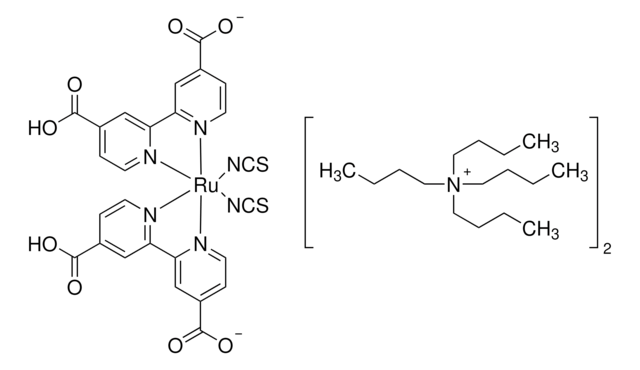추천 제품
분석
99.7% trace metals basis
양식
wire
autoignition temp.
860 °F
저항도
42.0 μΩ-cm, 20°C
직경
0.25 mm
bp
3287 °C (lit.)
mp
1660 °C (lit.)
density
4.5 g/mL at 25 °C (lit.)
SMILES string
[Ti]
InChI
1S/Ti
InChI key
RTAQQCXQSZGOHL-UHFFFAOYSA-N
일반 설명
Titanium (Ti) wire is a semiconductor material that has an energy band gap of ~4.85 eV and an electrical conductivity of ~10-13 Ω-1cm-1.
애플리케이션
Ti wire can be used in a variety of applications such as dye sensitized solar cells (DSSCs), solid phase microextraction fiber, biomedical use, and in the fabrication of TiO2 nanotubes.
수량
2.2 g = 10 m; 11 g = 50 m
Storage Class Code
11 - Combustible Solids
WGK
nwg
Flash Point (°F)
Not applicable
Flash Point (°C)
Not applicable
개인 보호 장비
Eyeshields, Gloves, type N95 (US)
이미 열람한 고객
Unbreakable solid-phase microextraction fibers obtained by sol- gel deposition on titanium wire
Azenha MA, et al.
Analytical Chemistry, 78(6), 2071-2074 (2006)
Porous titanium materials with entangled wire structure for load-bearing biomedical applications
He G, et al.
Journal of the Mechanical Behavior of Biomedical Materials, 5(1), 16-31 (2012)
Electrode coatings from sprayed titanium dioxide nanoparticles-behaviour in NaOH solutions
Hayden BE, et al.
Electrochemical Communications, 3(8), 390-394 (2001)
The 3-dimensional dye-sensitized solar cell and module based on all titanium substrates
Liu Y, et al.
Applied Energy, 87(2), 436-441 (2010)
Improved photocatalytic degradation of textile dye using titanium dioxide nanotubes formed over titanium wires
Kar A, et al.
Environmental Science & Technology, 43(9), 3260-3265 (2009)
문서
Biomedical implants are essentially foreign substances within the human body that must survive many years’ exposure to demanding mechanical and physiological conditions. Despite these challenges, metal implants have been widely used to substitute for or rebuild hard tissues such as bones and teeth.
자사의 과학자팀은 생명 과학, 재료 과학, 화학 합성, 크로마토그래피, 분석 및 기타 많은 영역을 포함한 모든 과학 분야에 경험이 있습니다..
고객지원팀으로 연락바랍니다.




